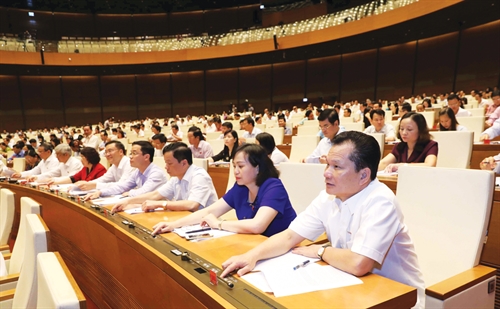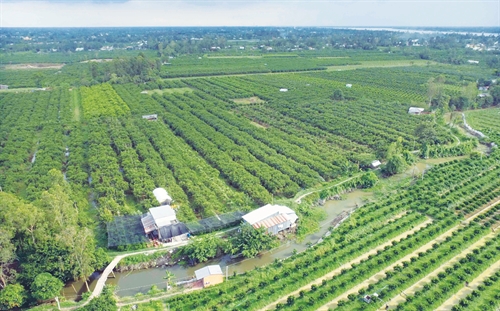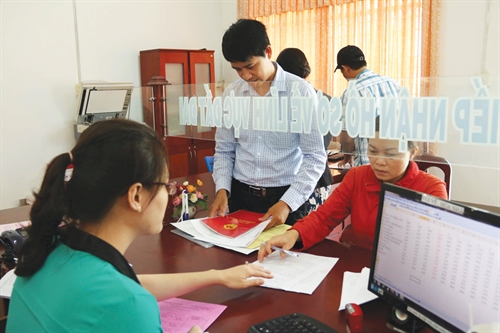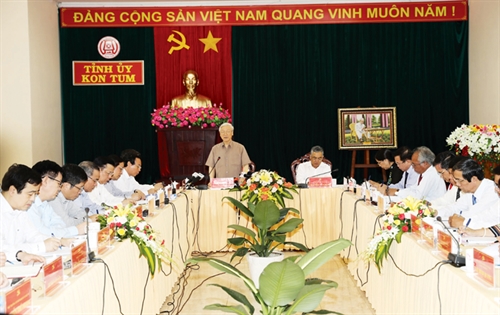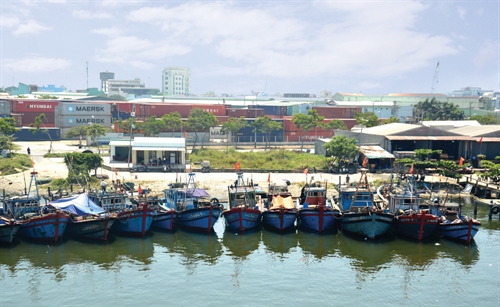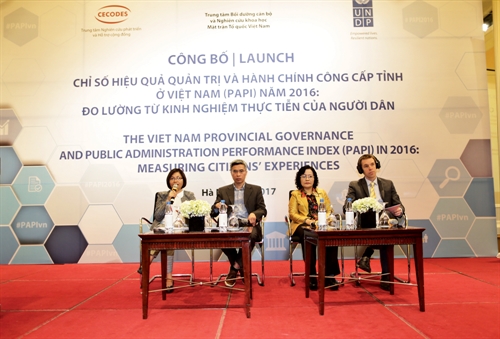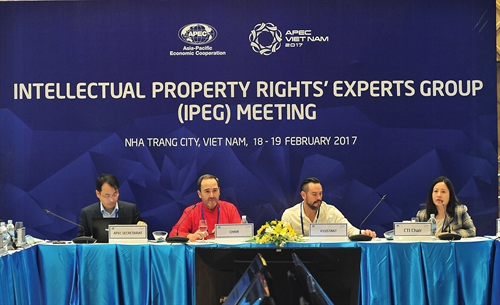OBJECTIVES
General objectives
To further complete the socialist-oriented market economy institutions, creating firm prerequisites for the successful building and synchronous and smooth operation of the socialist-oriented market economy; contributing to the most efficient mobilization, distribution and use of all resources for promoting fast and sustainable socio-economic development to achieve the goal of “a rich people and a strong, democratic, equitable and civilized country.”
Specific objectives toward 2020
To strive to synchronize one step further the system of socialist-oriented market economy institutions according to the universal standards of a modern and internationally integrated market economy. To basically ensure the synchronism between economic and political institutions, between the State and the market and the harmony between economic growth and cultural as well as human development, attain social progress and justice, and ensure social security, environmental protection and sustainable societal development. To proactively and actively integrate in the global economy in association with building an independent and sovereign economy.
Goal toward 2030
To synchronously complete and effectively operate the socialist-oriented market economy institutions in Vietnam.
MAJOR TASKS AND SOLUTIONS
Achieving the unanimous perception of the socialist-oriented market economy in Vietnam
The socialist-oriented market economy built in our country is an economy which fully and synchronously operates according to the market economy rules while ensuring the socialist orientation suitable to each period of national development; is a modern and internationally integrated market economy which is managed by the law-ruled socialist state and led by the Communist Party of Vietnam, aiming to achieve the goal of “a rich people, a strong, democratic, equitable and civilized country.”
The modernity and international integration of the socialist-oriented market economy in our country are manifest in the selective inheritance of the achievements of mankind’s market economy development, the practical experience drawn from more than 30 years of doi moi (renewal); a system of laws, mechanisms, policies, and market factors and adequate and synchronous types of smoothly operating markets, in the close connection with other economies in the world; and in the roles and functions of the State and the market defined and performed in accordance with universal international practices, principles and standards. The socialist orientation of the economy is consistently established and enhanced through the Party leadership and State management centering on humans, for everyone and by humans; brings into full play the role of the people as masters and realizes social progress and justice in every development step and policy.
The socialist-oriented market economy in Vietnam is characterized by the progressive relations of production suitable to the development level of the production force; by multiple forms of ownership and different economic sectors, of which the state economy plays the leading role and the private economy constitutes an important motive force of the economy. State enterprises play the key role and act as an important material force of the state economy. The state economy, the collective economy and the private economy constitute the core for development of an independent and sovereign economy. Players of different economic sectors are equal, cooperate and compete with one another for mutual development under law. Lawful enrichment is encouraged. Distribution is based mainly on labor fruits, economic efficiency and simultaneously on the contribution of funds and other resources and through the social security and welfare system.
In the socialist-oriented market economy, the State plays the role of orientating, building and completing the economic institutions; creating an environment of fair, transparent and healthy competition; employing instruments, policies and resources of the State to orientate and regulate the economy, boost production and business and protect resources and the environment; and develop cultural and social domains. The market plays the major role in mobilizing and efficiently distributing resources and acts as the main driving force to liberate the productive power. The State’s resources are distributed according to strategies, master plans and plans suitable to the market mechanism.
To continue completing the institutions on ownership and development of different economic sectors and various types of enterprises
To complete the ownership institutions
To fully institutionalize the property ownership of the State, organizations and individuals, which is defined in the 2013 Constitution. To ensure publicity and transparency of obligations and responsibilities in the state administrative procedures and public services so that the property rights are traded smoothly; to ensure the effect of enforcement and effective protection of the property ownership.
To complete the laws on land and resources for efficient mobilization, distribution and use of land and resources, addressing the situation of disputes, lawsuits, corruption and wastefulness in this area. To publicize and transparentize the management and use of public land; to intensify strict supervision and management and more efficient use of land areas allocated to communities and state enterprises.
To facilitate the transfer or lease of land use rights and the contribution of land use right values as capital; to support land accumulation and concentration for the development of industries and services in rural areas and large-scale and hi-tech commodity agriculture in association with assurance of sustainable job creation and income generation for farmers and firm maintenance of the socio-political stability in the countryside.
To complete the laws on management, exploitation and thrifty and efficient use of natural resources. The State shall assign the resource exploitation rights to enterprises under the market mechanism.
To complete the laws on investment with state funds, effective management and use of public assets; to clearly distinguish assets put into business from those used for implementation of social policies. To invest state funds in enterprises under the market mechanism.
To complete the institutions on intellectual property toward encouraging creativity, ensuring transparency and high reliability; the intellectual property rights shall be protected and enforced effectively.
To complete the laws on contracts and settlement of civil disputes in a uniform and synchronous manner. To renew and raise the effect and efficacy of institutions on settlement of civil disputes according to transparent, public and simple processes and procedures. To complete the regulations on property registration and transaction; to develop a transparent, transferrable and accessible registration system, particularly for real estate.
To complete the institutions on development of different economic sectors and various types of enterprises
To consistently implement a single business legal regime for all enterprises irrespective of ownership forms and economic sectors. All enterprises of different economic sectors shall operate under the market mechanism, are equal and healthily compete in accordance with law. To facilitate and accelerate the development of enterprises and the contingent of Vietnamese entrepreneurs to truly become the core and leading force in the cause of national industrialization and modernization as well as international integration, ensuring the independence and sovereignty of the economy.
To complete the laws on investment and business, particularly those on public investment and bidding. To ensure the economic entities’ rights to freedom of enterprise and healthy competition prescribed by the Constitution; to remove all barriers to investment and business activities. To step up administrative procedure reforms. To complete the relevant regulations in order to encourage and create the most favorable conditions for start-up activities.
To complete the institutions on competition, enhancing transparency in state monopoly. To get rid of the mechanisms of direct administrative intervention in and subsidy by the State for enterprises of all economic sectors.
To further improve the institutions on restructuring, renovation and raising of the efficiency of state enterprises up to the international business governance standards, which really operate under the market mechanism. To step up the restructuring and renovation of state enterprises operating in agriculture and forestry with a view to increasing efficiency in the use of land, forests and assets invested by the State, ensuring the benefits of the State and parties that are contracted with land areas and perennial orchards, preventing loss and waste of state funds and property.
To complete the institutions on, renovate and raise the operational efficiency of, public non-business units. To grant full autonomy and accountability to public non-business units in their operation, organization, payrolls, staff and finance in association with an independent evaluation mechanism. To socialize to the utmost public services, ensuring equality between public non-business units and non-public units participating in the provision of public services under the market mechanism.
The State shall adopt mechanisms and policies to support cooperatives in the access to funds, human resource training, technology transfer and market development. To renew the contents and method of operation of the collective economy. To develop various forms of cooperation and partnership with, and support for, farmers in the production, preservation, processing and sale of agricultural products; to widely popularize new and efficient production models; to develop various forms of cooperation and partnership in the production, processing and sale of agricultural products according to value chains, connected with sale outlets both at home and abroad; to vigorously shift from household-based production to large-scale, concentrated, cooperative and partnership-based production.
To further complete institutions on and facilitate the development of the private economic sector to truly become an important driving force of the national economy. To boost the formation and development of strong private economic groups with modern technologies and advanced governance capability. To complete the policies in support of the development of small- and medium-sized enterprises.
To raise the efficiency of foreign direct investment attraction; to take the initiative in selecting foreign investment projects with the transfer of advanced technologies and modern governance, with technological research and development bases located in Vietnam, with commitments to partner with and support domestic enterprises to participate in global value chains, conformable with the economic restructuring orientation and economic development strategies and master plans.
To complete the institutions on synchronous development of market elements and various types of markets
To complete the institutions on synchronous development of market elements
To consistently implement the market price mechanism, ensuring the correct, full, public and transparent calculation of constituents of prices of essential commodities and public services. Not to incorporate social policies in commodity and service prices. To shift from the allocation mechanism to the goods ordering mechanism; from the support for service providers to direct support for beneficiaries. To complete the laws on charges and fees toward applying service prices suitable to the market mechanism. To accelerate the completion of institutions on protection of consumer interests, properly and fully promoting the roles of consumers and consumer interest protection associations.
To drastically reform land-related financial policies toward simplicity, stability, publicity, transparency and fairness. To study and complete the law on property tax, particularly tax on land and real estate. To ensure the transparency of information on the land use rights market. To determine the land use rights value according to the market mechanism through auction and bidding of land-using projects and making sale and purchase agreements on the market; to make universal the determination of the land use rights value via independent and professional price appraisal organizations. To scrutinize and adjust the land use rights price bracket suitable to the market in each locality. To increase the application of the land lease method.
To realize equality in the access to input elements among enterprises of all economic sectors. To complete and effectively enforce legal provisions on publicity and transparency in the access to public resources, procurement and public investment. To enhance the transparency in state monopoly; to control, prevent and abolish enterprise monopoly. To complete the institutions on market mechanism-based distribution of resources into sectors, domains and localities operating with high effectiveness and spill-over effects. To complete the law on business bankruptcy under the market mechanism, institutions on protection of investors, ownership and property rights; not to criminalize economic and civil relations.
To complete the institutions for synchronous development and smooth operation of various types of markets
To boost the development of commodity and service markets, including export and import markets, domestic markets and border trading markets; to develop commercial infrastructure. To effectively implement international commitments. To strongly develop modern market transaction modes. To establish and apply goods quality, food hygiene and safety as well as environment standards suitable to domestic requirements and international commitments, rationally protecting the domestic market against foreign control and manipulation. To complete the laws on development of new markets, particularly the market of services with high intellectual and technological contents; markets of environmental industries, cultural industries....
To develop the financial market in a balanced and synchronous manner. To effectively implement the policy of restructuring the state budget and managing public debts. To step up public-private partnership. To raise the operation efficiency of the stock market and bond market; to form and put into effective operation the debt trading market. To develop the insurance market and accounting, auditing, tax consultancy and price appraisal service… markets.
To review, supplement and amend laws ensuring the implementation of the monetary policy for the objective of inflation control, effective coordination between monetary policy, fiscal policy and other policies. To administer the interest rates according to the macro-economic development, inflation and monetary market. To flexibly administer the exchange rates according to market signals. To increase the State Bank’s independence in administering monetary policy. To complete the law on restructuring of credit institutions in association with non-performing loan handling. To enhance financial and governance capabilities in conformity with international standards; to definitely handle weak credit institutions and address cross-investment and cross-ownership in the banking sector; to quickly and safely develop financial and banking services.
To renew and vigorously and synchronously develop the science-technology market. To intensify protection and enforcement of intellectual property rights. To adopt policies of supporting and encouraging organizations, individuals and enterprises to invest in research and development, technology transfer and application of scientific-technological advances to production and business; to determine enterprises as an important force in science-technology development and application; to concentrate on raising the technology absorption capability of enterprises. To complete technology import policies; to step up investment in applied research, enhancing domestic designing and manufacture levels.
To continue renewing vigorously and synchronously the financial management mechanism for, organization and implementation of scientific-technological activities. To study and renew the mode of using state budget funds for investment in sciences and technologies. To complete the regulations on venture investment, raising the operation quality of technology nurseries and hi-tech enterprises. To apply the public-private partnership mechanism in the implementation of technology renewal, innovation, research and development projects. To further develop vigorously industrial parks and hi-tech parks. To establish a national database on technologies and technology experts. To develop scientific and technological product consultancy, appraisal, brokerage and valuation services.
To complete the laws, mechanisms and policies for development and smooth operation of the real estate market. To build suitable institutions and models for associating the industrialization process with urbanization and new-countryside construction. To formulate social policies on housing.
To concentrate on formulating and completing the law on development of primary and secondary markets of the rights to use land, including agricultural land, ensuring the open, transparent and orderly operation of these land use rights markets. To develop, and raise the operation efficiency, of the agricultural land lease market. To study and complete the law on taxation of the use of property, particularly the use of land.
To complete mechanisms and policies for synchronous and integrated development of the labor market in scale, labor quality and occupation structure. To adopt mechanisms and policies for orienting labor movement and rational labor distribution by region, and for migrant workers and their families to have equal access to social services.
To raise the operation quality of the system of job counseling organizations according to law. To transparentize labor market information. To further renew and raise the quality of education and training, particularly tertiary education and vocational training. To complete the institutions on conciliation and arbitration in the settlement of labor disputes.
To step up the reform of wage regimes, well addressing the relationship between labor productivity increase and wage increase, taking labor productivity increase as the basis for wage increase. To further improve the policies on wages, remuneration, social insurance, unemployment insurance, health insurance, labor accident insurance; to form the wage mechanism based on market principles; to ensure the harmony of interests of employees and employers. To bring into full play the role of trade unions in enterprises in protecting the lawful rights and interests of laborers.- (VLLF)
